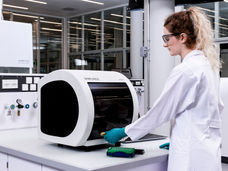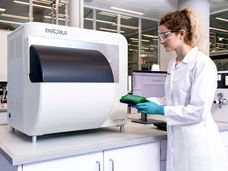Biosensors made of cellulose
Recyclable, skin-friendly and biodegradable
electroencephalography (EEG), electrocardiography (ECG), electromyography (EMG) – all of these non-invasive medical diagnostic methods rely on an electrode to measure and record electrical signals or voltage fluctuations of muscle or nerve cells underneath the skin. Depending on the type of diagnostics, this can then be used to measure electrical brain waves, or the currents in the heart or muscles. Present methods use metal sensors which are attached to the skin using a special gel to ensure continuous contact. Researchers at the University of Korea and Technische Universität Berlin have now developed so-called biosensors made of the plant material cellulose. They not only offer better and more durable conductivity than conventional electrodes. They are also 100 percent natural, reusable, do not cause skin irritation like other gels and are biodegradable. The paper “Leaf inspired homeostatic cellulose biosensors” has now been published in the journal Science Advances.

Sensors modeled on the structure of leaves (symbolic image)
pixabay.com
The crucial keyword for the new sensors is: homeostasis. In biology, this refers to the maintenance of a state of equilibrium. This is how leaves, for example, regulate the osmotic pressure in their cells, i.e. how much water they store. This internal cell pressure depends on the water content of the neighboring cells, but also on the environment (dry or humid) and is constantly readjusted.
“Most people know the feeling of walking through a damp garden with bare feet. Leaves stick to the soles of our feet and simply don’t fall off, even when we move,” explains Professor Klaus-Robert Müller, head of the Machine Learning group at TU Berlin and director of the Berlin Institute for the Foundations of Learning and Data (BIFOLD). “The reason that leaves cling so effectively to our skin is due to the swelling properties of cellulose, the material that the cell walls of plants are made of, and is based on the principle of homeostasis.”
Sensors modeled on the structure of leaves
Until now, cellulose has mainly appeared as a material for synthesis or filtration. Because cellulose itself is not conductive, it seemed unsuitable as potential material for electrodes. When cellulose fibers are placed in salty water, however, they swell and show great electrical conduction properties.
Inspired by the structure of leaves, the researchers have developed, analyzed and tested biosensors consisting of two layers of cellulose fibers that resemble the leaf structure and can be saturated with salt water. On top of the cellulose material lies a carrier membrane which in turn docks to a metal electrode with a cable.
Recyclable, skin-friendly and biodegradable
“These sensors showed continuously high-quality electrophysiological signals in various applications such as EEG, EMG, and ECG. They adhere excellently to different skin types – without the need for a synthetic gel. They also demonstrate good adhesion properties under stress, for example with sweating or moving test subjects,” explains Müller. Furthermore, these sensors feature a high transmission quality, low electrical resistance (impedance) and little resistance variance during long-term measurements.
The researchers have already tested the sensors in various application scenarios and on different skin types. “We were also able to demonstrate the versatility and robustness of the biosensors in combination with machine learning algorithms that were tested in challenging real-world situations. Tests have been conducted with test persons riding a bicycle or playing a computer game with a brain-computer interface, meaning the subjects were moving during the measurement, which can potentially generate artifacts,” says Müller.
Other advantages of the biosensors: They allow mass production in a simple and cost-effective process, are recyclable, skin-friendly and biodegradable. Klaus-Robert Müller is convinced: “These homeostatic cellulose biosensors are suitable for a broad range of clinical and non-clinical applications.”
Original publication
Most read news
Original publication
Topics
Organizations
These products might interest you

Octet R2 / Octet R4 / Octet R8 by Sartorius
Full power on 2, 4 or 8 channels: Label-free and GxP-compliant analysis of molecular interactions
Innovative label-free real-time protein quantification, binding kinetics and rapid screenings

Octet RH16 and RH96 by Sartorius
Efficient protein analysis for process optimisation and manufacturing control in high-throughput
Label-free protein quantification and characterization of protein-protein interactions

Octet SF3 by Sartorius
Surface Plasmon Resonance (SPR) using Single Dynamic Injections for Kinetics and Affinities
Curvature is Key - Adding a ‘Third Dimension’ to the Binding Curve

Get the analytics and lab tech industry in your inbox
By submitting this form you agree that LUMITOS AG will send you the newsletter(s) selected above by email. Your data will not be passed on to third parties. Your data will be stored and processed in accordance with our data protection regulations. LUMITOS may contact you by email for the purpose of advertising or market and opinion surveys. You can revoke your consent at any time without giving reasons to LUMITOS AG, Ernst-Augustin-Str. 2, 12489 Berlin, Germany or by e-mail at revoke@lumitos.com with effect for the future. In addition, each email contains a link to unsubscribe from the corresponding newsletter.






















































